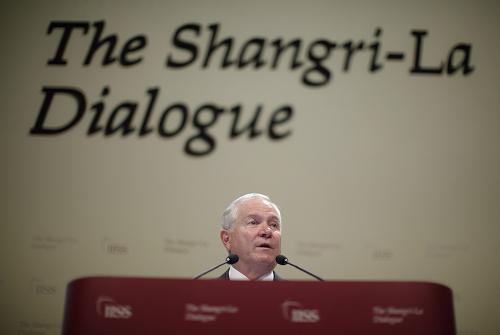Gates: U.S. to 'enhance' military presence in Asia
 |
|
US Defense Secretary Robert Gates makes a keynote speech at the 10th IISS Asia Securities Summit/Shangri-La Dialogue in Singapore on June 4, 2011. |
The U.S. Secretary of Defense Robert Gates reassured its allies in the Asia-Pacific region on Friday that it will maintain and enhance its strong presence in the region, while reiterating the principle of resolving conflict without the use of force.
In a speech that best demonstrates the strategy of the United States for growing its influence in Asia, Gates elaborated on the history of its relations with allies such as Japan and South Korea over the past decades as well as countries such as Vietnam and India.
"Taken together, all of these developments demonstrate the commitment of the United States to sustaining a robust military presence in Asia -- one that underwrites stability by supporting and reassuring allies while deterring, and if necessary defeating, potential adversaries," Gates said.
The defense chief said the United States has taken a number of steps towards establishing a defense posture across the Asia- Pacific "that is more geographically distributed, operationally resilient, and politically sustainable."
The military posture proposed will maintain American presence in Northeast Asia while enhancing U.S. presence in Southeast Asia and the Indian Ocean, he said.
Gates also said the U.S. military is going to be increasing its port calls, naval engagements, and multilateral training efforts with multiple countries throughout the region in the coming years.
The U.S. presence and the associated impact and influences should not solely be measured in terms of conventional metrics, or "boots on the ground," he said, responding to questions from U.S. representatives and representatives of its allies crying wolf over the development of China at a dialogue session.
Gates said the U.S. Navy and Air Force are working together to develop a new concept of operations called Air-Sea Battle, despite acknowledging that Cold War turbulence has given way to new partnerships and cooperation in nations across Asia.
The concept of Air-Sea Battle is aimed to ensure the U.S. military will "continue to be able to deploy, move and strike over great distances in defense of allies and vital interests."
Nevertheless, Gates also said that the United States and China are working together to build a positive, cooperative and comprehensive relationship, and that the military-to-military ties have steadily improved in recent months.
As defense minister, he has made it a priority to build military-to-military ties, and there is now an important dialogue mechanism, he said.
Gates was speaking at the 10th Asia Security Summit hosted by the London-based think tank International Institute for Strategic Studies, also known as the Shangri-La dialogue. It gathers defense ministers and senior defense officials from 27 countries and regions this year.
The summit has become an important forum for security dialogues in the Asia-Pacific. Malaysian Prime Minister Najib Razak, as the keynote speaker, said he believed the way ahead must be built on cooperation and not on confrontation and called on leaders and countries at the dialogue to play their part.
Like many leaders at the dialogue, Najib said the world economies are becoming more and more integrated and interdependent, and the production processes are much more dispersed across borders.
"It no longer makes sense for global powers to go to war: they simply have too much to lose," he said.
The Malaysian prime minister also said that the world should see the rise of China as a cause for optimism rather than concern.
"China may be expanding -- it has enjoyed spectacular economic growth of 9.5 percent a year for the last 20 years -- but it is not going to dominate the globe in the way the biggest economic forces of the past once did," he said. "In the late 1940s the United States not only had the largest GDP (gross domestic product) of any nation, it also accounted for more than half of the world's wealth."
As for China, even when it, as predicted, becomes the world's largest economy in the world in around 30 years, it is likely to account for less than a quarter of the global GDP, he said.
He also dismissed China's growing military capacity as a cause for undue alarm, citing his experience with China.
"In Malaysia we know well that China's first commitment is to peace," he said.
Australian Defense Minister Stephen Smith also said the region must continue to develop habits of dialogue which help countries in the region withstand and resolve serious tensions if and when they arise.
Practical military and defense cooperation, in humanitarian assistance and disaster relief, peacekeeping training and operations, exercises and training and maritime security, will build habits of mutual respect, trust and cooperation amongst the militaries, he said.
Australia has committed to developing strong and positive military and defense relations with China through dialogue and practical activities, including exchange of visits by senior officials and naval vessels, he said.
 0
0 






